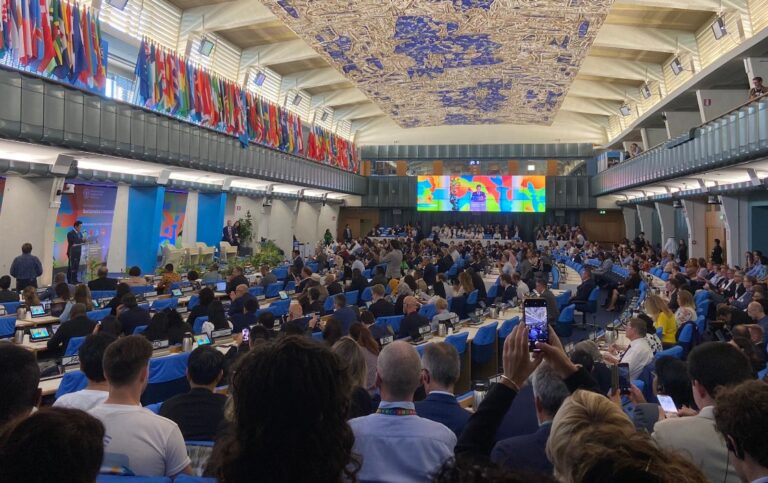Gone are the days of battles and wars when food scarcity was a major global issue. However, even in today’s 21st century, food security and sustainable agriculture are paramount issues. Hunger figures are rising dramatically. In such a scenario, The Food and Agriculture Organization, commonly known as FAO, is a beacon of hope.
But what exactly is FAO, and what roles and purposes does it serve? How is it committed to a healthier, more equitable planet? Let’s dive deep to explore FAO, its mission, role and purpose in detail.
Table of Contents
What is FAO?
The Food and Agriculture Organisation (FAO) is a specialized United Nations agency which works towards creating food sustainability and fighting against hunger at global levels. The FAO comprises 197 member nations, with its headquarters in over 130 states.
It was established after World War II in 1945 in Rome, Italy. The aftermath of World War II brought widespread food shortages globally. The main goal of the FAO was to solve this issue of food shortage, thus ensuring that every single human gets adequate nutrition and food. Besides food sustainability, it also addresses other related major issues such as food security and agriculture.
The FAO also has its FAO Council elected by the member nations, which is the decision-making body. The FAO Council is made up of representatives of member states. From organizing the work programme to approving the budget, the FAO takes all the major decisions.
We celebrate World Food Day every year on 16th October to commemorate the founding anniversary of FAO. The International Fund for Agricultural Development (IFAD) and World Food Programme are the sister programs of the FAO.
Read also: The Global Hunger Index: a closer look into monitoring hunger worldwide
The departments of FAO
Employing over 11,500 people, the Food and Agriculture Organisation (FAO) is divided into 7 departments, namely,
- The Agriculture and Consumer Protection Department: This department was set up to fight against poverty. It’s also responsible for ensuring compliance with safety standards and practices in the surrounding environment;
- The Climate, Land, Biodiversity, and Water Department: As the name suggests, this department advocates for the sustainable development of land, water, energy and biodiversity;
- The Corporate Services Department: This department is responsible for handling the administration of the organisation’s financial policies, statements and procedures. Moreover, it also supports the governing bodies;
- The Economic and Social Development Department: This department analyses the current problems and trends related to food security and develops policy guidelines regarding it. It also improves economic production and promotes social protection on the global agenda;
- The Fisheries and Aquaculture Department: This department specifically deals with the development of two mains: fishing and aquaculture;
- The Forestry Department: As the name suggests, the Forestry Department advocates the socio-economic importance of forests. It works for the preservation and conservation of forest cover;
- The Programme Management Department and Technical Cooperation: This department plays a pivotal role in aiding member countries with their initiatives while also swiftly addressing any challenges or emergencies in the realm of food and agriculture.
The role of FAO
In the realm of global sustenance, the Food and Agriculture Organization (FAO) emerges as a specialized arm of the United Nations. It spearheads international endeavors aimed at vanquishing the pangs of hunger and ushering in an era of comprehensive food security.
Rooted in its mission lies its objectives:
- Elevating nutritional standards
- Augmenting agricultural yields
- Enhancing the quality of life in rural enclaves
- Kindling the flames of worldwide economic prosperity
To navigate this intricate landscape, the FAO has pinpointed strategic focal points. These focal points encompass the eradication of hunger, the banishment of food scarcity, and the elimination of malnutrition.
Concurrently, it endeavours to bestow vigour upon agriculture, rendering it more prolific and sustainable. The FAO is also working against rural impoverishment and aspires to ensure the coherence and efficiency of agricultural and culinary networks.
Moreover, FAO lends its support to international initiatives aimed at the rejuvenation of localized economies. Member states find guidance and assistance from FAO in their endeavours to usher in modernity within the domains of agriculture, forestry, and piscatorial pursuits.
Furthermore, FAO serves as a fount of policy counsel and technical acumen for member nations. This encompasses facets such as agriculture, livestock management, fisheries, forestry practices, and the intricate realm of nutrition.
The Field Programme, another facet of FAO’s multifaceted mandate, extends a helping hand to developing nations. Its mission is to catalyze rural development and fortify the bulwarks of food security. It impels progress on numerous fronts, ranging from amplifying agricultural yields to enhancing land and water utilization efficiency.
Read more: Food security under the global standard: the 10 most malnourished countries












